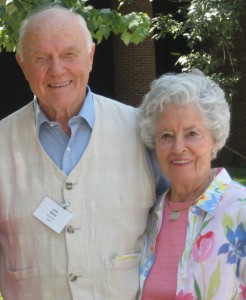A new book about the oratory accomplishments of members of Toastmasters International features Hollins Communications Research Institute (HCRI) stuttering therapy alumna Shannon Armes. Toastmasters International is a nonprofit educational organization that operates clubs worldwide for the purpose of helping members improve their communication, public speaking and leadership skills.
The book,Voices Bold and True, written by John Steinbach and published by Beacon Publishing, highlights stories of courage, growth, and friendship in public speaking among Toastmasters International members. Following is Armes’s excerpt.
Shannon Armes, CC, ALB
“My Toastmasters experience in 2012 is very memorable. My family and friends were in the audience at the area, division and district international speech contests that spring. I also remember the standing ovation and tears in the eyes of people at the area contest following my speech. Reflecting on such an experience encourages me to continue sharing my unique story along my Toastmasters journey. By doing so, I hope to inspire fellow stutterers to face each day with courage and determination in spite of disfluency.”
Disfluency—defined as ‘interruption in the flow or rhythm of speech’—is not a word that most people may be familiar with. But for a stutterer like Shannon Armes, it’s a constant presence.
“Imagine not being able to answer your phone, introduce yourself, order a meal at your favorite restaurant or read a bed time story to your child. Imagine the need to support your family, but not getting beyond a job interview for lack of effective communication. These are simple, everyday occurrences the average individual takes for granted. But for a stutterer, such situations bring about anxiety, fear and embarrassment,and are often avoided in a variety of creative ways.”
Stuttering is hereditary in Shannon’s family: her grandmother, an uncle, and other members of her extended family have the affliction. She has had to deal with it all her life. In 2009, she took part in a unique speech therapy program that gave her specific skills to improve her fluency. “I am grateful for the intensive stuttering treatment program at HCRI (Hollins Communications Research Institute) in Roanoke, VA.
I spent over 100 hours over 12 days acquiring the ability to replace faulty speech muscle behaviors that cause stuttering with new muscle activities that generate fluent speech. HCRI’s stuttering therapy was hard work and has made a remarkable difference in my ability to communicate. But I have to be vigilant with regular practice so the skills I learned will become habitual. So I decided to join Toastmasters. It gives me the opportunity to practice those skills and improve my fluency in a supportive and encouraging environment, while also working on my communication and leadership abilities.”
She found out about Toastmasters from a fellow stutterer who was a member. “He shared with me how helpful it was for him and encouraged me to find out more about it. So I went online and looked up Toastmasters. I found a club in my area, visited a few times, and loved it. I’ve been a member of Motivators Toastmasters now for 5 years.”
Shannon may have her challenges on the Toastmasters communication track, but that has not deterred her from taking an active part in the leadership track. She has served as her club’s sergeant at arms, secretary, and VP of education. She is currently club president, as well as an area governor. She enjoyed her term as sergeant at arms, “because you’re often the first point of contact for guests at club meetings. Introducing myself was always difficult for me, so sergeant at arms was the first officer position I volunteered for.”
She also valued her role as VPE: “I enjoyed working closely with club members to help them achieve their specific goals while also striving to achieve the club’s Distinguished Club Plan.” She sees the role of VPE extending beyond the club. “I encourage individuals to take on leadership and speaking opportunities outside of the club. Doing so is a great way to learn more about Toastmasters and network with others who have valuable experience and knowledge from which to learn. It is important not only to the success of your club, but to the Toastmasters organization overall. One club’s success has a direct impact on the area, the division, and the district in which it is in.”
Shannon has a special appreciation for two aspects of Toastmasters. “…I am very enthusiastic and passionate about Toastmasters and what the organization has to offer. No matter your age or where you are in your career or your personal life, everyone has something to gain from Toastmasters. I take every opportunity I have to share my unique story and what Toastmasters has done for me.”
“It’s a very emotional subject for me. As a stutterer, I face daily challenges the average individual can never understand. Toastmasters is the perfect environment I need to step outside of my comfort zone and practice the skills I learned at HCRI. The simplest way I can put it: The Toastmasters organization has given me my voice again, both personally and professionally. That’s the biggest takeaway I can share with someone else.”
Shannon is looking forward to continuing her progress and someday achieving the highest educational designation, the Distinguished Toastmaster, or DTM. “Of course, I’m looking forward to becoming a DTM, but that will come in time. I’m taking my Toastmasters journey to fluency one speech and one leadership role at a time. I’m taking it all in and loving it as I go.”
To contact author John Steinbach and/or purchase his book, send an email tovoicesboldandtrue@gmail.com.
 While HCRI is a small nonprofit organization, the Institute has made big, ground-breaking advancements in the treatment of stuttering.
While HCRI is a small nonprofit organization, the Institute has made big, ground-breaking advancements in the treatment of stuttering.

.jpg)



 azonSmile is a simple and automatic way for you to support HCRI every time you shop, at no cost to you.
azonSmile is a simple and automatic way for you to support HCRI every time you shop, at no cost to you.